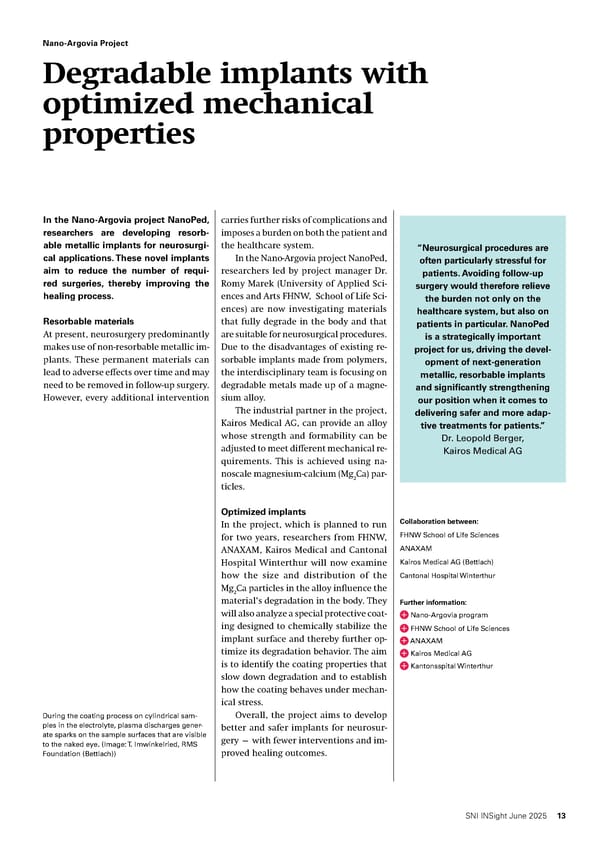During the coating process on cylindrical sam- ples in the electrolyte, plasma discharges gener- ate sparks on the sample surfaces that are visible to the naked eye. (Image: T. Imwinkelried, RMS Foundation (Bettlach)) Nano-Argovia Project Degradable implants with optimized mechanical properties In the Nano-Argovia project NanoPed, researchers are developing resorb- able metallic implants for neurosurgi- cal applications. These novel implants aim to reduce the number of requi- red surgeries, thereby improving the healing process. Resorbable materials At present, neurosurgery predominantly makes use of non-resorbable metallic im- plants. These permanent materials can lead to adverse effects over time and may need to be removed in follow-up surgery. However, every additional intervention carries further risks of complications and imposes a burden on both the patient and the healthcare system. In the Nano-Argovia project NanoPed, researchers led by project manager Dr. Romy Marek (University of Applied Sci- ences and Arts FHNW, School of Life Sci- ences) are now investigating materials that fully degrade in the body and that are suitable for neurosurgical procedures. Due to the disadvantages of existing re- sorbable implants made from polymers, the interdisciplinary team is focusing on degradable metals made up of a magne- sium alloy. The industrial partner in the project, Kairos Medical AG, can provide an alloy whose strength and formability can be adjusted to meet different mechanical re- quirements. This is achieved using na- noscale magnesium-calcium (Mg2Ca) par- ticles. Optimized implants In the project, which is planned to run for two years, researchers from FHNW, ANAXAM, Kairos Medical and Cantonal Hospital Winterthur will now examine how the size and distribution of the Mg2Ca particles in the alloy influence the material’s degradation in the body. They will also analyze a special protective coat- ing designed to chemically stabilize the implant surface and thereby further op- timize its degradation behavior. The aim is to identify the coating properties that slow down degradation and to establish how the coating behaves under mechan- ical stress. Overall, the project aims to develop better and safer implants for neurosur- gery — with fewer interventions and im- proved healing outcomes. Collaboration between: FHNW School of Life Sciences ANAXAM Kairos Medical AG (Bettlach) Cantonal Hospital Winterthur Further information: Nano-Argovia program FHNW School of Life Sciences ANAXAM Kairos Medical AG Kantonsspital Winterthur “Neurosurgical procedures are often particularly stressful for patients. Avoiding follow-up surgery would therefore relieve the burden not only on the healthcare system, but also on patients in particular. NanoPed is a strategically important project for us, driving the devel- opment of next-generation metallic, resorbable implants and significantly strengthening our position when it comes to delivering safer and more adap- tive treatments for patients.” Dr. Leopold Berger, Kairos Medical AG 13 SNI INSight June 2025
 SNI Insight - 2025 June Page 12 Page 14
SNI Insight - 2025 June Page 12 Page 14